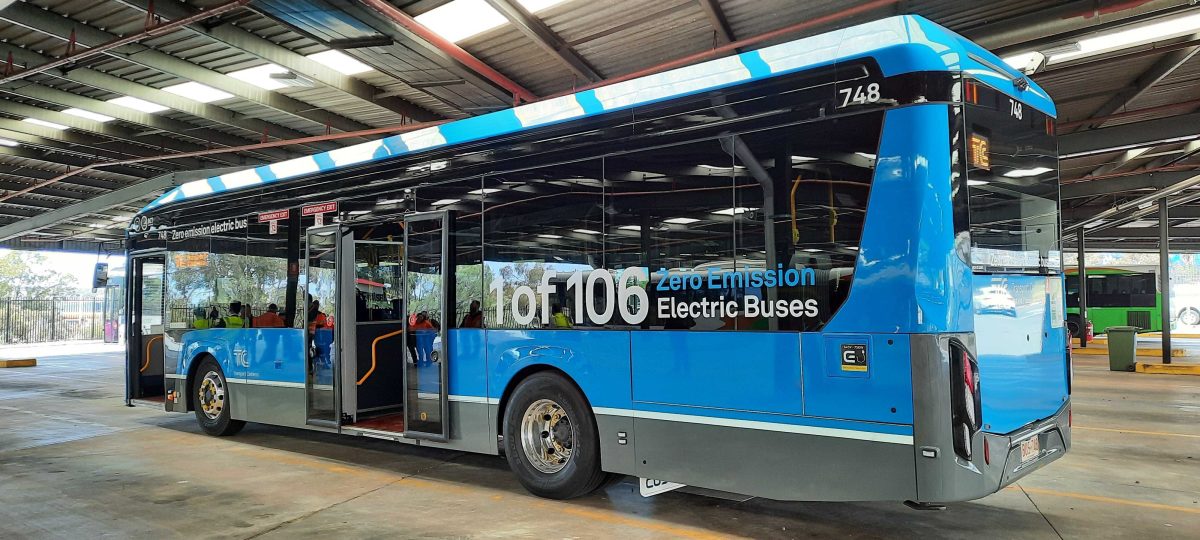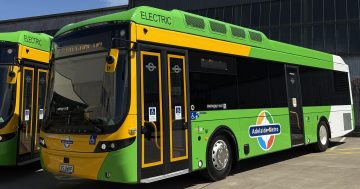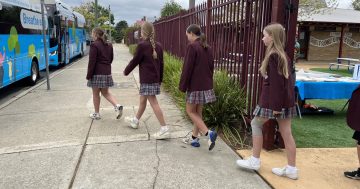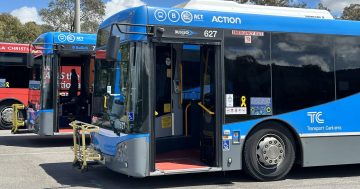
The Canberra Liberals feel the signage on electric buses in the ACT is misleading about the size of our zero-emission fleet. Photo: Ian Bushnell.
Tempers have flared as the ACT Government has been accused of spreading a “false message” and “blatant lie” through signage on its electric buses.
Shadow Transport Minister Mark Parton accused the government of misleading the public by wrapping electric buses with the message: “One of 106 zero emission electric buses”.
The Zero Emissions Transition Plan was released in September 2020, and on 31 May 2023, the government announced it would increase the bus fleet to 106 zero-emission buses over the next three years and had secured 90 buses to do so.
As of 8 April, there were 12 battery electric buses on Canberra’s road.
Mr Parton said the signage was a “blatant lie” and “false message” that was confusing Canberrans.
“There are not 106 buses of the electric variety in Canberra,” he said.
“Most sensible people would arrive at the conclusion that the message being transmitted is that this bus, right here, is one of 106 in our fleet.
“The claim is false. It is false and it should be removed.”
He accused the government of “dropping the ball” on modernising the bus fleet because its focus was light rail and that supply issues could no longer be used as an excuse.
Mr Parton also pointed to the absence of four Custom Denning battery electric buses, announced last October, from our roads.
“Nobody’s seen them. They’ve been gone for six months,” he said.
“We call them ghost buses … how about coming clean with us and telling us what the problem is?
“We call upon the government to get serious about its own electrification targets and to stop running buses with propaganda signage, which is untrue.”
Acting Transport Minister Tara Cheyne didn’t hold back on what she thought of the Canberra Liberals’ motion in the Legislative Assembly.
“This motion is a stunt,” she said.
She pointed to Transport Minister Chris Steel’s previous explanation of delays to electric buses and supply chain issues and insisted no promises had been broken.
“[The signage] doesn’t say, ‘I’m on the road’, it says ‘I’m one of 106 electric buses’,” Ms Cheyne said.
“The 106 buses is still a commitment, that hasn’t changed. Yes, the delivery [timeframe] has changed – that is frustrating, we’re all frustrated – but it doesn’t mean that we’re not going to do it.
“There’s nothing that’s misleading.”
Ms Cheyne said 106 buses had been “secured” and “procured”.
As for the Custom Denning buses, she explained that it had taken four months from signing the contract with the Australian company to delivery, a marked improvement on the wait times experienced by those buses ordered from overseas.
However, when they underwent acceptance testing, issues were found.
“While all of our expectations were that they would successfully complete the acceptance testing regime and be commissioned to enter operation soon after, there were identified technical specification issues,” Ms Cheyne said.
“They meant that all vehicles were required to be returned to Custom for some remediation.
“Until they do meet our standards, we’re not going to put them on the road. We’re not going to compromise safety and passenger comfort or service frequency just so that Mr Parton doesn’t call them ‘ghost buses’.”
It’s understood the four buses are now back with Transport Canberra for re-inspection.
ACT Greens transport spokesperson Jo Clay expressed her party’s disappointment that more electric buses weren’t being put on the road as quickly as promised.
“I want to put on the record that we have not met targets set for the number of electric buses on the road,” she said.
“It’s true and we want to make sure that we are telling history as it is.”
Failed targets from the 2020 plan included having the Woden Bus Depot complete and operational by the end of 2022 and having at least 65 electric buses on the road by the end of this financial year.
“We’ve seen less than 20 per cent of the electric buses committed in September 2020 delivered on time to date,” Ms Clay said.
“There are good reasons why these deadlines weren’t met, but the ambitions of 2020 have been significantly scaled back.
“[We] want to put more money towards progressing public transport infrastructure and procurement so that we can get these things done faster.”
Original Article published by Claire Fenwicke on Riotact.





